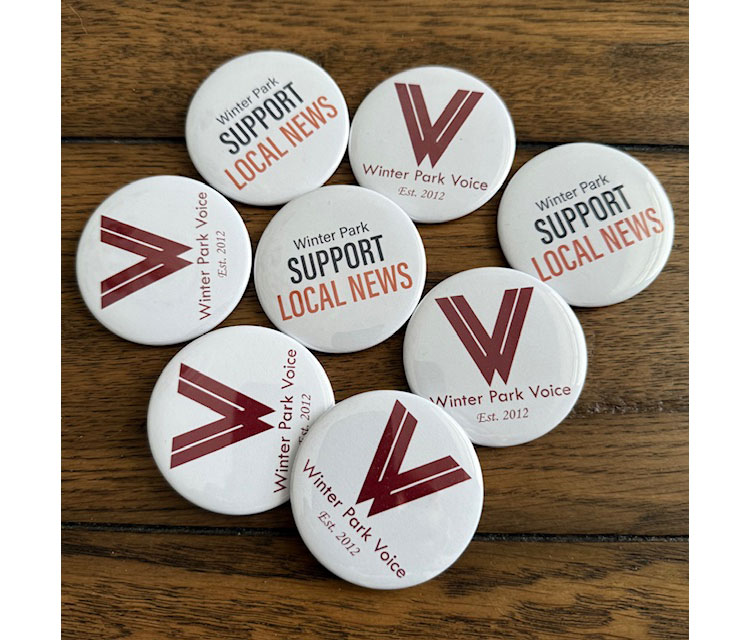
by Beth Kassab | Jan 13, 2026 | Election, News
News Collaborative of Central Florida Receives $50K to Support Continued Growth
The group, which includes the Winter Park Voice, also hired its first project manager
Jan. 13, 2026
Staff Report
News Collaborative of Central Florida (NCCF), a collective of independent local news outlets and aligned partners working toward a more informed and engaged Central Florida, is announcing the next phase in its evolving service to the region. NCCF launched publicly in January of 2025 to collaborate on reporting about the local impacts of Florida’s Unauthorized Public Camping and Public Sleeping law (House Bill 1365). Over 100 stories were shared, amplifying reach of this vital reporting to residents.
That success has now been met with a combined $50,000 in funding from Collaborative Journalism Resource Hub (the Hub) and Central Florida Foundation, fueling the Collaborative’s next phase of growth. As part of this evolution, NCCF has onboarded its first dedicated team member, and in 2026, NCCF partners will pool their resources to provide comprehensive coverage of this year’s elections.

Erica Rodriguez Kight
“Our first year made it clear that collaborative journalism works, and we’re ready to take on elections coverage – made possible by the support from Collaborative Journalism Resource Hub and Central Florida Foundation,” says Judith Smelser, NCCF’s first task force chair and Central Florida Public Media’s president and general manager. “Ongoing community support is essential to sustaining this unique journalism model and ensuring it can continue delivering impactful reporting year over year.”
NCCF has contracted with Erica Rodriguez Kight as a dedicated project manager to establish governance, coordinate communication across partner organizations and support community engagement efforts that bring residents into the reporting process. Erica is the assistant director for mass media at the Nicholson School of Communication and Media at the University of Central Florida, where she’s also an associate lecturer in journalism and media production. Her background includes reporting roles at The Bradenton Herald and ABC affiliate WCJB-TV and a reporting fellowship with Cortico AI.
“Collaborative Journalism Resource Hub provides comprehensive support to journalism collaboratives across the U.S.,” says Amy Maestas, director of Collaborative Journalism Resource Hub. “News Collaborative of Central Florida is the first of 20 collaboratives the Hub will support over the next five years to advance the field of collaborative journalism. NCCF is a strong and dedicated group of media and community organizations that are willing to evolve from a competitive mindset to collaboration as a commitment to bringing stronger journalism to their communities. We look forward to being a resource as they join the robust and growing practice of collaborative journalism in the U.S.”
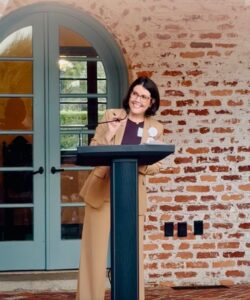
Beth Kassab
Central Florida Foundation serves as a convener, operational advisor and fiscal sponsor for NCCF and is an independent, trusted bridge builder across the journalism ecosystem. As the initial charitable investor in this emerging journalism model, Central Florida Foundation is proud to support local media coming together to better serve the region.
“This collaboration of journalists comes online at a critical moment, when Central Floridians are facing important decisions. By bringing together a more diverse group of journalists committed to helping residents understand what they are voting on, the News Collaborative of Central Florida plays an important role in strengthening our community,” says Mark Brewer, president and CEO, Central Florida Foundation. “Central Florida Foundation has a long history of supporting civic engagement, and local media is a vital pillar of a healthy, civically engaged region.”
The Winter Park Voice is contributing reporting and editing to provide resources and information to empower readers in Winter Park to be more engaged Central Florida residents.
“We know how much our readers value trustworthy news about their city and we are excited to bring them even more information about the 2026 ballots through the next phase of this partnership,” said Beth Kassab, editor of the Voice. “As a small nonprofit devoted to local news, we believe collaborations like this one are the way forward to keep credible, fact-based and independently-vetted information accessible to our community.”
Together, the media outlets participating in NCCF will be able to dig deeper into important local issues, cover more candidates and races and engage more community members.
WinterParkVoiceEditor@gmail.com
To comment or read comments from others, click here →
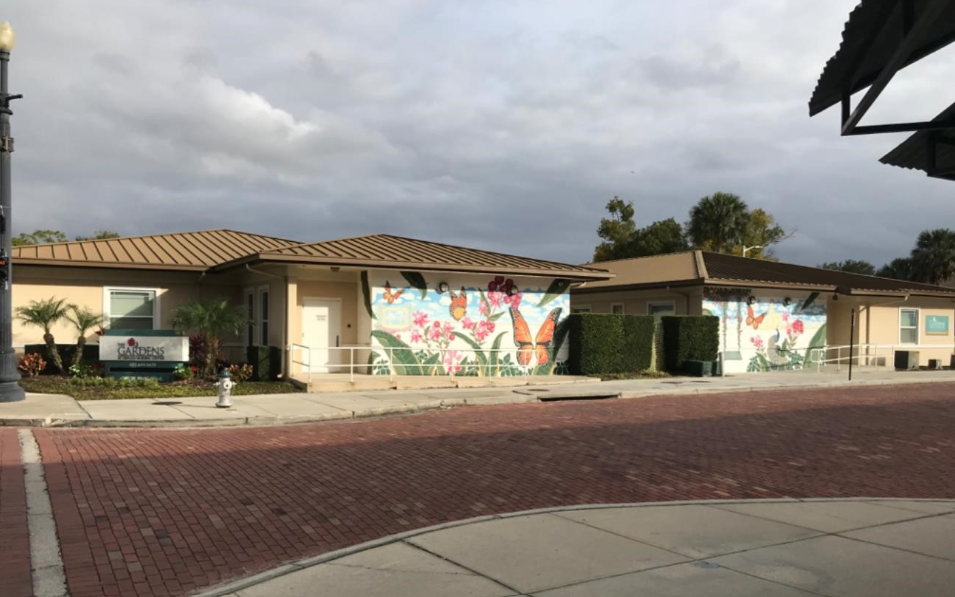
by Beth Kassab | Jan 7, 2026 | City Commission, News, Zoning and Development
Mixed-Use Development Proposed for DePugh Nursing Center Site
The new project by Z Properties will include commercial and residential elements on the prominent corner of Morse and Pennsylvania. The nursing center closed last year.
Jan. 7, 2026
By Beth Kassab
The Gardens at DePugh Nursing Center, which closed in the fall after 70 years, will be demolished and replaced with a “flexible, mixed-use environment offering modular opportunities to purchase space” along with a residential component, according to an announcement on Wednesday by Z Properties.
The Winter Park-based development and design firm led by Zane and Emily Williams said in a news release that the residential portion is still in the early planning. The commercial part of the development will look for a mix of “professional, creative, retail, hospitality and service-oriented businesses, with generous ceiling heights, thoughtfully-designed interiors and flexibility to support a range of uses.”
Zane Williams, who did not immediately respond to an interview request, acknowledged the prominence of the corner at 550 W. Morse Boulevard near Pennsylvania Avenue, and the potential for the new buildings to “set the tone” as visitors enter downtown Winter Park via Morse.
“Our goal here, as always, is to develop with intention and care, and to add beauty to our surroundings,” Williams said in the release. “This is a special corner, and we feel a responsibility to create something locals and visitors will pass by and think, ‘That feels right.’”
The new development will bring further change for the historically Black neighborhood west of Park Avenue that dates back to the city’s founding. The area has undergone significant gentrification over the past 25 years with the redevelopment of Hannibal Square and a number of larger homes replacing small, single-story houses.
The DePugh center opened in 1956 as the first state-approved nursing home where aging Black residents could seek care during segregation. The center was named for Mary Lee DePugh, who moved to Winter Park in 1937 to work for a white family she knew from the Chicago area and began advocating to provide health care to those in need as part of her work with the Ideal Woman’s Club, which she founded on the west side of the city. She died before the center opened.
Leaders of the Center decided to close it because of rising operating costs.
Z Properties applied for a demolition permit in October, said city Planning & Zoning Director Allison McGillis. The permit is likely to be approved because the building is not historically designated.
A representative of the firm said renderings of the proposed project will be available in the coming months.
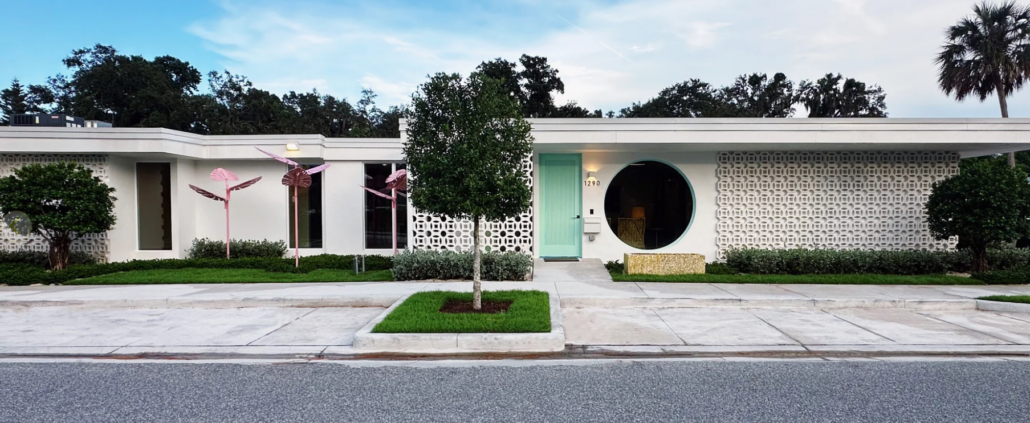
A portion of the Palmetto Grove work spaces by Z Properties near Seven Oaks Park. The project, which refurbished older buildings, recently won praise from City Commission members. (Photo courtesy of Z Properties)
Williams said in the release that one unique aspect of the plan will be the option for business owners to also own a physical space.
“There are so many business owners who dream of designing and owning their own building in the same way people dream of building their homes,” he said. “Ownership allows you to establish permanence, identity, and control of your space — this project is about making that a reality.”
Z Properties is partnering with Stream Realty on the development.
“It’s exceptionally rare to come across the opportunity to own custom-designed commercial space in Winter Park,” Darryl Hoffman, executive vice president at Stream Realty, said in the news release. “We’re thrilled to partner with Zane on this first-of-its-kind development for the area.”
Z Properties recently received praise from the City Commission related to its makeover of workspaces near Seven Oaks Park known as Palmetto Grove along Palmetto Avenue. The buildings were refurbished to have an elevated, high-end look not far off of Orange Avenue where the city is working to improve one of its gateways.
The release said the team is aiming for completion of the project on the DePugh site in 2027 and will unveil its name and more details in the near future.
WinterParkVoiceEditor@gmail.com
To comment or read comments from others, click here →
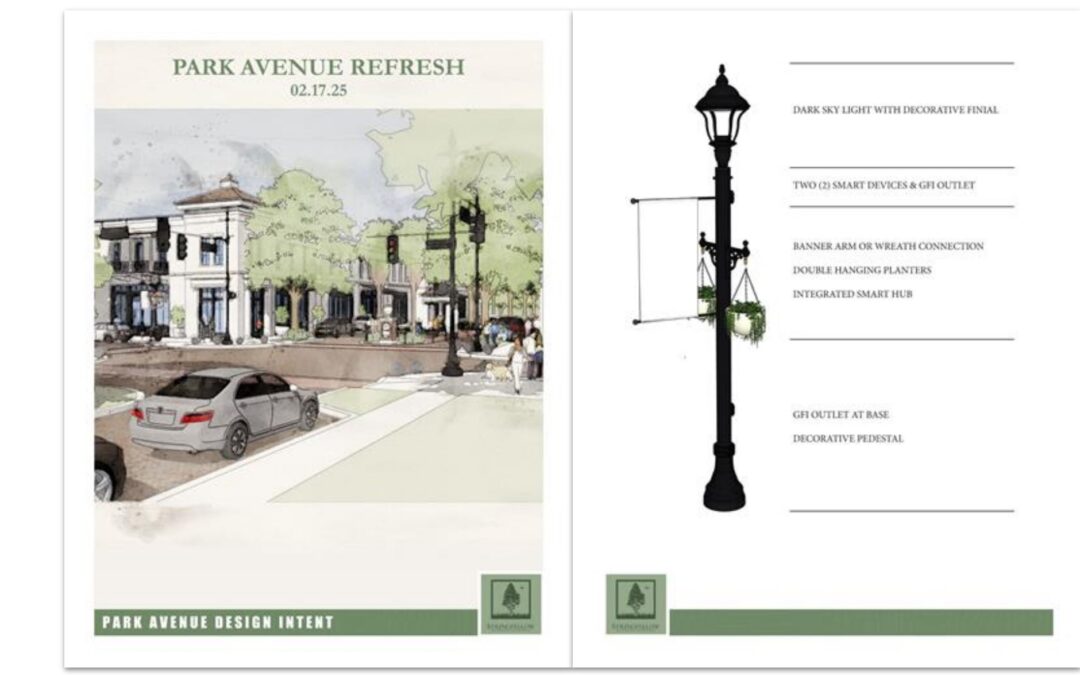
by Beth Kassab | Jan 6, 2026 | Arts and Culture, City Commission, News
Construction on Park Avenue Will Begin this Month Starting on the North End
The estimated $8.5 million project will upgrade technology and aesthetics along the busy shopping and dining district
Jan. 6, 2026
By Beth Kassab
Construction will begin later this month on the first major overhaul in 25 years of Park Avenue’s aesthetics and technology — a project known as the Park Avenue Refresh that will include nearly $1 million worth of new streetlights and a total price tag estimated at $8.5 million over the next three years.
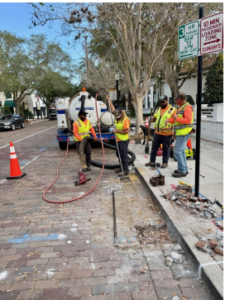
Workers began some tasks last year as the city prepared to launch Phase 1 construction this month. (Photo courtesy of the city of Winter Park)
The work on the first of the three project phases is slated to start Jan. 20 on the north end of the avenue and run from Webster Avenue, near the University Club of Winter Park and the city’s nine-hole golf course to Garfield Avenue along the northern border of Central Park.
The stretch includes the Morse Museum, which houses a large collection of glass windows, lamps, jewelry and other delicate work by Louis Comfort Tiffany, and museum leadership has expressed concerns about potential vibrations from construction, Clarissa Howard, the Refresh’s project manager, told the City Commission last month.
Howard said city staff is working with the museum and others along the stretch such as St. Margaret Mary Catholic Church, which also runs a school with busy drop-off and pick-up times, to minimize disruptions from the construction.
“Fortunately, our project will not be using jack hammers or equipment that would create that type of severe vibrations that could cause damage to the fragile glass,” Howard said in an email. “We are very sensitive to the fragility of the museum’s pieces so we are working closely with them on our construction schedule and activity. We were asked by the museum team to do our work around the museum during the day so they could have staff on standby to keep an eye out for their pieces during construction.”
The new streetlights, which the commission voted in April to purchase for nearly $1 million, include “dark sky” lamp fixtures that cast LED lights downward, wi-fi receivers, electric hook-ups for cameras and speakers and internal sprinklers for potted plants that will hang from the fixtures. The new cameras on the north end of Park Avenue are for security and will allow law enforcement to obtain footage of incidents for a period of time if needed.
In addition to the new light poles, the avenue will get some noticeable upgrades in the form of new oak trees, new sidewalks, repairs to raised planter beds, new potted plants, new trash and recycling bins and bollards or short posts designed to prevent cars from encroaching on the sidewalks. Other work will be done underground to wire the new lights and irrigation system, help contain tree roots and address stormwater runoff concerns.
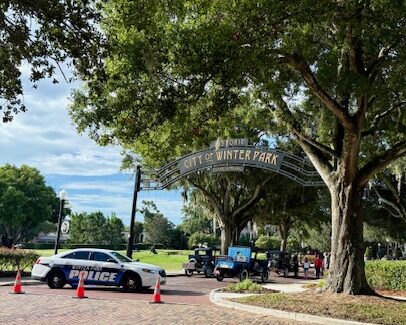
A new sign arches above the north end of Park Avenue near where the Refresh project is slated to begin later this month.
Some work will be done overnight to minimize disruptions to shops and businesses, which rely on foot traffic along one of the region’s busiest shopping and dining hubs.
Last year downtown Winter Park logged more than 1.3 million visitors, according to a city count.
Construction on Phase 2 of the project will start in 2027 and run from Garfield to New England Avenue.
Alex Stringfellow, who serves as the urban planner for the project, said the next phase will be mindful of coordinatization around the considerable space occupied by cafe tables along the sidewalks as well as maintaining the health of the oak tree in front of Briarpatch, the largest along the avenue.
Phase 3 will begin in 2028 and run from New England to Fairbanks Avenue.
WinterParkVoiceEditor@gmail.com
To comment or read comments from others, click here →
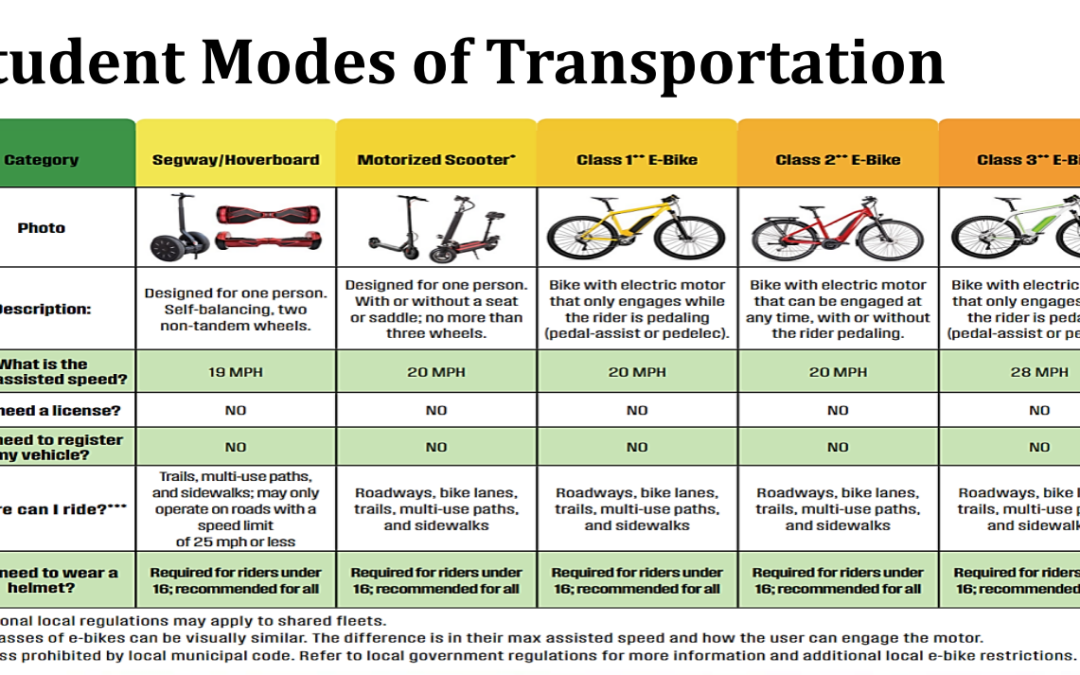
by Beth Kassab | Dec 31, 2025 | City Commission, News, Police and Public Safety, Schools
Are Electric Scooters and Bikes Too Dangerous for Schools?
Orange School Board members and Winter Park officials say more safety measures are needed
Dec. 31, 2025
By Tilly Raij
Stricter rules over electric scooters and bikes on school campuses – or even a temporary ban — are slated for discussion next month as officials from Orange County Public Schools and Winter Park grapple with soaring injuries and accidents attributed to the high-speed vehicles.
School board members tossed around potential new regulations such as requiring licenses, training and speed limits at a meeting in November. Stephanie Vanos, the member who represents District 6, which includes Winter Park, said she recognized that regulations involving the devices can be challenging to carry out.
“It’s hard to enforce speed when some of these don’t even have speedometers. It’s hard to enforce licensure because they come from anywhere,” said Vanos, who raised the idea of a temporary ban of electric scooters and similar devices until a more complete evaluation of the situation is done.
OCPS Superintendent Maria Vasquez suggested a ban could be the easiest way to enhance safety without shouldering school staff with the extra work of enforcing new rules while a larger safety plan is explored.
“…I don’t think we want to prohibit them on our campuses, but if we’re looking at the conditions that currently exist, that’s probably the one action we can take that doesn’t add more burden to our staff while we are looking at other options,” Vasquez said.
The comments came in response to a presentation last month from Joe Silvestris, who leads the school district’s Office of Safety and Emergency Management.
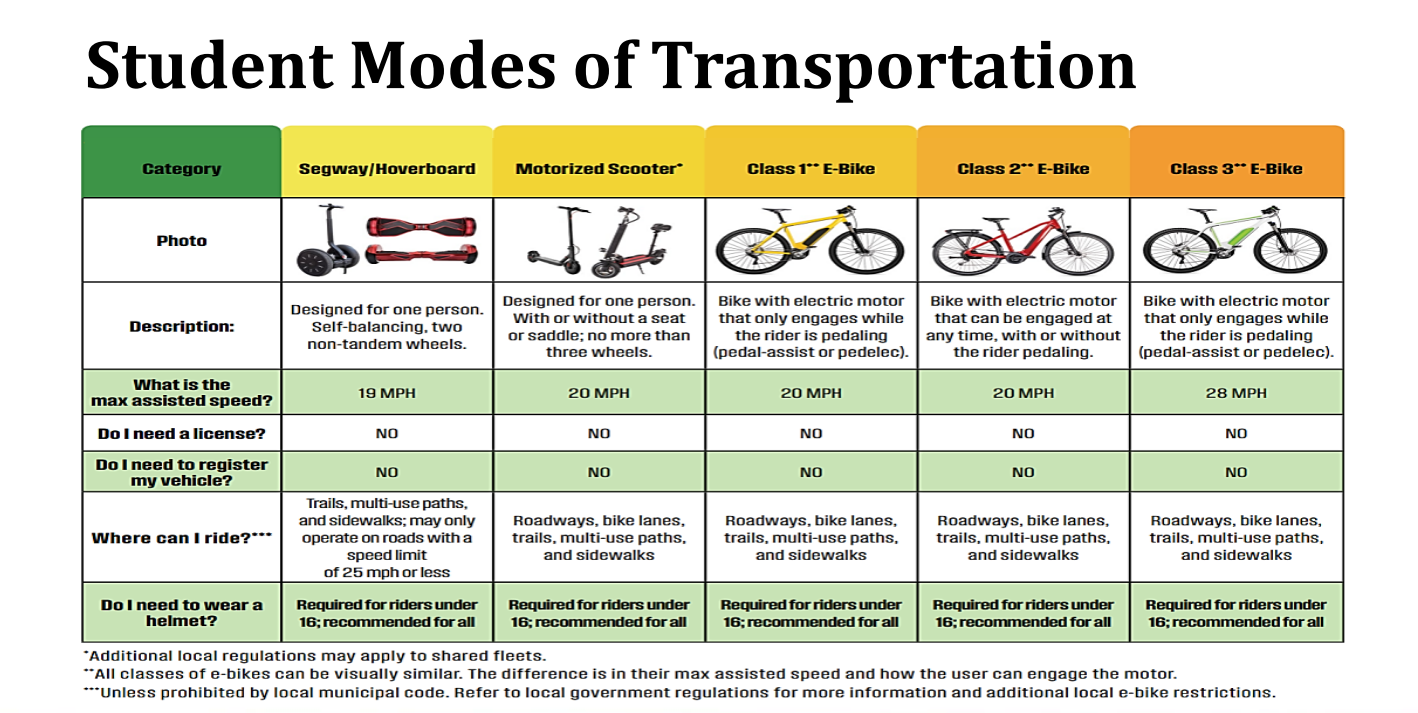
An OCPS presentation detailed the different devices students are commonly using on campuses.
Since 2017, electric scooter injuries in the U.S. have surged by 400%, with Florida being a top state in emergency room visits for such injuries, Silvestris told the school board at a November work session, citing data from the Consumer Product Safety Commission. These accidents have more than doubled since 2023 for children under 15, he said.
Lack of helmets, poor infrastructure, and rider inexperience and poor behavior were some common causes of scooter-related trauma that Silvestris listed. It was also noted that collisions involving distracted drivers, particularly newly licensed high schoolers, are prevalent on OCPS campuses. The district has previously provided guidance on these vehicles in the Deputy Superintendent Newsletter and on ParentSquare, an app used to send messages to families. The district has also partnered with Bike/Walk Central Florida to deliver safety presentations in schools.
But electric bikes and scooters are so common now that some school and city officials say more is needed.
Winter Park City Commissioner Craig Russell, who is a teacher and coach at Winter Park High School, said he has seen first-hand the dangers of electric scooter accidents and has worked with Winter Park Police on a safety campaign aimed at students and parents.
“A student in my class now has to withdraw and do Hospital Homebound because he was hit by a car [while] riding his e-scooter,” Russell said. “I think as a community we need to learn more about the scooters as a tool. We have to empower ourselves with knowledge of not only how to operate them, but how to teach our kids how to operate them properly and know the rules of the road.”
While some policy makers are worried about the dangers of electric scooters and bikes, many students see them as an essential part of daily life to get to school, work, sports practice and other activities.
“They’re not dangerous because if you really know what you’re doing and if you’re aware of your surroundings, you really can’t go wrong,” said Marco Malave, a sophomore at Winter Park High who uses his e-scooter to get to school and extracurricular activities. Although Malave has had accidents with his scooter before, he doesn’t believe licensing or a ban are needed as long as simple rules are created to “keep everyone safe.”
School Board member Alicia Farrant, who represents District 3, which runs from downtown Orlando south to near Walt Disney World, questioned the idea of a ban at the November meeting and suggested more safety education would suffice.
“As the school district, our place here is really to educate parents, educate the community on what is happening…but I don’t know that it is our duty as a school district to eliminate something completely, and I would be more in favor with each school having more of a say in…their area,” Farrant said.
District 2 member Maria Salamanca, who represents Lake Nona, advocated for rules governing scooters and bikes to be added to the OCPS Code of Student Conduct, which currently doesn’t mention the motorized devices.
“I have seen a really large uptick of very dangerous accidents with scooters on the way to school and very near to campus,” Salamanca said. “I think one of the things I’m seeing a lot, specifically in high school as well, is very young drivers who are distracted and then very fast scooters who are on their phone, and they crash in or around campus.”
Board Chair Teresa Jacobs expressed the need for a thorough course of action if rules are not followed.
“I would look along the lines of what is already not allowed, increase the limitations hopefully at a statewide level, and then use the authority of our Code of Student Conduct to put in place consequences for those students who are violating those,” she said.
When the Florida Legislature convenes in January, at least one member is already pushing a bill to require operators of high-speed versions of the devices hold a license and pushes for other safety measures like collecting and maintaining data on electric scooter and bike accidents.
Under HB 243 filed by Rep. Yvette Benarroch, R-Naples, operators of Class 3 e-bikes, which can go up to 28 miles per hour, would be required to have a learner’s permit or driver’s license.
“I filed this bill because government’s first duty is to protect the people,” Benarroch said, according to the Florida House’s informational page about the bill. “Freedom comes with responsibility, and when public safety is at risk, we have a duty to act. Guided by the Constitution and common sense, this bill protects lives, preserves liberty, and does what’s right for all Floridians.”
Potential new rules for school campuses are expected to be discussed at a meeting for Orange County principals in January. And Russell is planning a community meeting for parents and students in Winter Park.
WinterParkVoiceEditor@gmail.com
Tilly Raij is a sophomore at Winter Park High School. Her work has been published in The Community Paper, J Life Magazine and The Wildcat Chronicle.
To comment or read comments from others, click here →
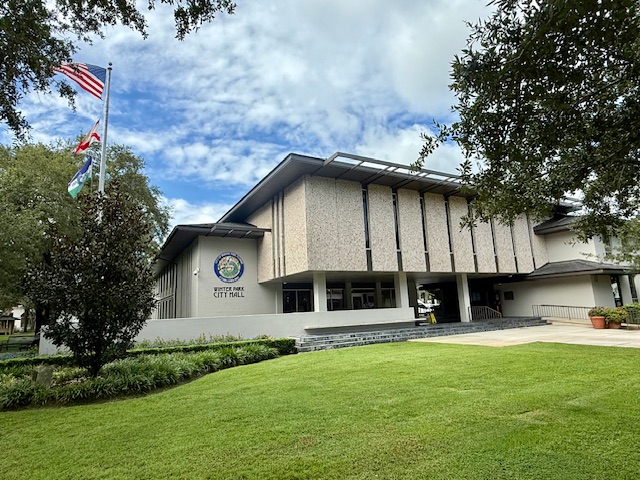
by Beth Kassab | Dec 16, 2025 | News, Police and Public Safety
Family of Man Shot by Police at Wedding Receives $400,000 Settlement
It is unknown who is paying the settlement related to the death of Daniel Knight, but the city of Winter Park says it is not paying the money
Dec. 16, 2025
By Gabrielle Russon
The estate for Daniel Knight — the man shot and killed by Winter Park Police at his niece’s wedding in 2022 — is receiving a $400,000 settlement from a federal wrongful death lawsuit filed against the city of Winter Park, according to Polk County probate court records.
What’s not clear in the court records: Who is actually paying the money?
Knight’s estate “reached a confidential settlement agreement with named and unnamed defendants for a total of $400,000,” according to Sept. 24 court filing that gave an estate status report to the courts. The city of Winter Park and the two officers involved in the shooting were the named defendants in the federal lawsuit.
Winter Park officials already confirmed that neither the city or its police officers are the source of the settlement money.
Word of an agreement came earlier this year not long after a partial victory for the family when a federal judge ruled her claim could proceed against one of the officers, who fired his weapon seven times. The judge called the shooting “so far beyond the hazy border between excessive and acceptable force that the official had to know he was violating the Constitution even without case law on point.”

Daniel Knight
The settlement money will go to Knight’s adult child and his two minor children although $184,323 — almost half — will go to lawyers for fees and legal expenses, according to an Aug. 28 court filing petitioning to approve the structured settlement agreement.
The Courts approved that settlement agreement Sept. 29, a Nov. 21 filing said.
Paul Aloise Jr., the lawyer representing Knight’s fiancé, declined to comment nor acknowledge that a settlement had even been reached.
The mention of a $400,000 settlement appeared in the probate court records filed in Polk County Circuit Court. The records have been viewable online for weeks – which is how Winter Park Voice learned of the amount. A spokeswoman for the Polk County Clerk of the Circuit Court & Comptroller said Friday the records were confidential and should not have been released. A short time later the court filings were no longer accessible on the website.
Previous virtual hearings in the probate case have been closed to the public this year.
No amount of money is worth the pain of losing her brother, said Katrina Knight, the mother of the bride, and who is not part of the settlement agreement.
Any settlement “doesn’t really mean anything to our family because the whole reason we even pursued this is to clarify what actually happened,” said Katrina Knight, who said the police put out misleading information about her brother’s death to justify his killing.
A Winter Park Events Center manager called 911 to complain about Knight, 39, acting “violent” and “trying to beat people up” at the wedding.
“There’s no video of him beating anybody up, pushing people, choking people,” Katrina Knight said. “There’s video of him dancing, having fun.”
“He just had too much to drink.”
No police officers have been held criminally responsible for Knight’s death. The federal lawsuit against the city of Winter Park was settled and dismissed in May without the city having to admit wrongdoing or pay anything to Knight’s family.
Police arrived at the wedding, and the situation escalated in seconds. In less than two minutes, Knight was dead.
U.S. District Judge Roy B. Dalton Jr. noted that Knight’s family had “sufficiently pled that the use of deadly force was not objectively reasonable under these circumstances” in a ruling this year.
“Here, Knight’s family begged the officers to slow down and pleaded that he was not hurting anyone, but [Sgt. Kenton] Talton shot him less than two minutes after arriving on the scene,” Dalton wrote in his Jan. 28 order. “Yet the initial crime for which (Knight) was approached was relatively insignificant—at best, drunk and disorderly. He posed little serious danger to two armed police because he was unarmed and drunk. He was not a flight risk given that he was surrounded by family.”
Police told Knight and his sister to “back up” and “move out of the way” 13 seconds after arriving. When Police Officer Craig Campbell tried to separate Daniel and Katrina Knight, Daniel yelled not to touch his sister and pulled her closer, previously released police body-worn camera footage showed.
A struggle ensued. Knight hit Campbell, who fell down. Talton shot at Knight, firing seven times. Five bullets struck Knight.
Knight left behind his three children and his fiancé Mellisa Cruz, who filed the wrongful death lawsuit against the city of Winter Park and police.
The American Civil Liberties Union and some law enforcement experts were critical of Winter Park Police for not using de-escalation tactics to calm the situation down, which they argue, could have prevented the physical altercation with police and Knight’s death.
“By slowing things down and using some distance, that gives the officers more time to come up with a plan,” Don McCrea, a 35-year law enforcement veteran who runs Premier Police Training, previously told Winter Park Voice. “Yelling or barking orders – that’s typically not considered a de-escalation tactic. Giving people an opportunity to explain what’s going on and take in the big picture, that’s what de-escalation is more about.”
WinterParkVoiceEditor@gmail.com
To comment or read comments from others, click here →

by Beth Kassab | Dec 12, 2025 | City Commission, News, Uncategorized, Zoning and Development
Via Tuscany Homeowner Owes More Than $300k in Code Fines
Construction on the house began in 2018 and just concluded this year, prompting repeated complaints by neighbors
Dec. 12 , 2025
By Beth Kassab
The owner of an ultra modern mansion on the corner of Via Tuscany and Howell Branch Road owes more than $331,000 in code enforcement fines after the City Commission refused the man’s request to eliminate the fines he accumulated during nearly seven years of construction.
Fernando Bermudez, the owner of the home through Casselberry-based Developer and Builder Group LLC, told city officials in a letter dated Sept. 5, 2025 that the drawn-out construction timeline was the result of complications brought on by COVID-19, which killed one of his partners, and Hurricane Ian, which struck in September of 2022.
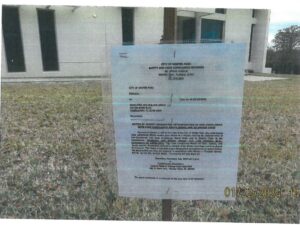
A snapshot included with Winter Park code enforcement documents shows a notice of violation posted in front of the home.
But the construction process at 2661 Via Tuscany started long before those events when the first permit was granted by the city in September of 2018. The certificate of occupancy for the 4-bedroom, 4,500-square-foot house was finally issued in July of this year.
Bermudez, who attended the City Commission meeting on Wednesday, said through his attorney that he was unaware of the fines and blamed a number of problems on his contractors, which changed repeatedly during the project.
But Gary Hiatt, building and permitting director, showed commissioners minutes from a Code Enforcement Board hearing in November of 2022 that showed Bermudez was in attendance and spoke along with a contractor about the timeline of the project. At that meeting, the board ordered that fines of $250 a day per violation would begin accumulating if the house wasn’t completed in 60 days, according to records.
“There were multiple times where they gave us, ‘We’ll be done by here or we’ll be done by here,’ and it just never came to fruition,” Hiatt said.
Violations, which included allowing permits to expire without completing the project and failing to meet deadlines, went on in at least one case for more than 900 days and, in another, more than 300.
“The incomplete vacant structure remains a public nuisance,” the code board concluded in a March 23, 2023 order that said fines would continue and the city would place a lien on the property.
In his letter to city officials to request the fines and lien be eliminated, Bermudez claimed ignorance about the existence of the fines and detailed how construction materials ordered from Europe were delayed by the pandemic as well as how the project was impeded by his own illness and the loss of his partner to the virus.
A Realtor.com listing for the property, which is now up for sale for $6.6 million (more than $1,400 per square foot), boasts of two primary suites (one on each floor), lighting fixtures from Greece, Italian porcelain flooring and “unparalleled craftsmanship, high-end finishes, and an open-concept layout for those who appreciate architectural brilliance and luxury living.”
The house, “follows commercial-grade construction standards, making it a bunker-style fortress unlike any other,” according to the listing.
But Bermudez wrote that the amount of the fine is “a debt impossible for us to pay.”
He said “the real estate market is now extremely slow” and he faces potential foreclosure by a private lender.
But commissioners said they didn’t hear any good reasons to reduce or eliminate the fines.
“These are legitimate fines in my opinion,” Commissioner Craig Russell said, noting that Bermudez’s company had developed other houses so should have had some familiarity with the process.
Russell and Commissioner Warren Lindsey also noted how the lengthy construction process affected the neighborhood.
Neighbors complained to the city about the project repeatedly, citing the unfinished work, debris and other violations.
“Overall, the process has been unprofessional (single workers showing up after hours or on weekends as if the whole project is some sort of shady after thought), unnecessarily drawn out and damaging to our property,” one neighbor wrote the city.
WinterParkVoiceEditor@gmail.com
To comment or read comments from others, click here →















Recent Comments